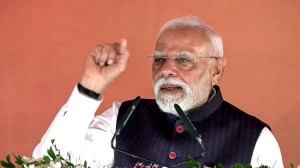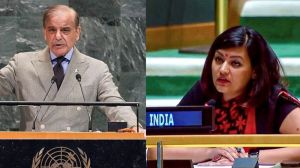Political endings
Remember the refrain: “Why don’t good people join politics?” It was one of those statements that popped up in ordinary conver...

Remember the refrain: “Why don’t good people join politics?” It was one of those statements that popped up in ordinary conversation all the time, particularly during elections. What’s the use of voting, someone would invariably say, they are all chors anyway. And back would come the response: what else if good people like you don’t join politics?
Now ‘‘good’’ had some definite connotations in this context. Good meant middle class, educated and appreciative of qualities such as discipline, cleanliness and so on. The opposite of ‘‘good people’’, that is, the people who did join politics, were the ‘‘masses’’: urban slum-dwellers, poor villagers, caste leaders, unwashed, illiterate and supposedly prone to criminal activity or at least inefficiency and indiscipline. These formed the multitude. The elite could never hope to win against their sheer numerical strength. So the question was of course rhetorical: good people did not join politics because they could never hope to win.
Suddenly all that seems to have changed. ‘‘Good people’’ are joining politics in droves.
Film stars and TV stars (not sons of the soil but smart, urbane types who can make near passable comments on the state of the nation), ex-models and beauty queens, former policemen, bureaucrats, businessmen, socialites and so on. ‘‘Good people’’, it seems, are no longer out of place in politics, ‘‘good people’’ can even win.
The change did not come about overnight. The 1984 election threw up a larger number of graduates in Parliament than usual. The entry of Rajiv Gandhi also marked a new beginning. The former pilot, a family man with an interest in photography, could not have been more unlike the traditional politician, as were the people he surrounded himself with — professionals, actors and the like. In the years that followed we have witnessed a large number of journalists and sportspersons too throwing themselves into the fray.
In a sense the trend probably reflects the shifting composition of the Indian populace. The middle class has grown in size. The disappearance of stigma attached to the flaunting or consumption of wealth has also brought about a gentrification among politicians. The new mobile flashing, fashionably appareled politico is not perceived as being as much of a threat to the middle class as he once was, regardless of the constituency he draws his support from. And television has made politics glamorous. Watching the familiar faces, listening to cogent sound bites, entering the sort of mass rally on the evening news that the middle class professional would never dream of physically attending has demystified politics. It is no longer the dirty business that ‘‘decent people’’ had no place in; it is exciting and accessible.
There is now an interesting fluidity about politics and its place in Indian society. If one puts aside the matter of electoral fate for the moment (that is, how many of these new entrants will actually win at the hustings and how many will be booted out), then there is a free-for-all air about a profession that was once considered out of bounds for all but hardcore politicians and those from allied fields such as social work and so on. A similar infusion of talent from outside — Arun Shourie, Vinod Mehta, Pritish Nandy, to name some — brought a new energy to English language journalism in the late seventies-early eighties. And while the focus has been on the stars jumping on to the political bandwagon, there is also the fact that non-governmental organisations that once considered politics taboo are no longer fighting shy of participating. In time the process could lead to a widening of the terms of political discourse apart from bringing in people of specialisation.
It could. On the other hand, it could also mark the beginning of the disintegration of the political system. Seems too dramatic a prediction? Perhaps it is. But consider how the whole notion of politics has changed over the years. In the past politics was about representing sections of the people. These could have been rich, poor, low caste, high caste, maharaja, businessmen — but the idea was to put forward the interest of a certain class or group of people. Today, judging by the cross section of people jostling for attention and from views expressed by many young people, it appears that politics is increasingly perceived as a forum for self-advancement.
Politics is good business. Like the babu’s chair, political clout offers commercial possibilities. Politics is influence, politics is protection. And for some stars it now appears politics is little more than another ad campaign. Yes, some of this has been true for a long time. But now with everyone and their uncle wanting their fifteen minutes of netadom, something’s gotta give. Is it the end of politics?





- 01
- 02
- 03
- 04
- 05


























